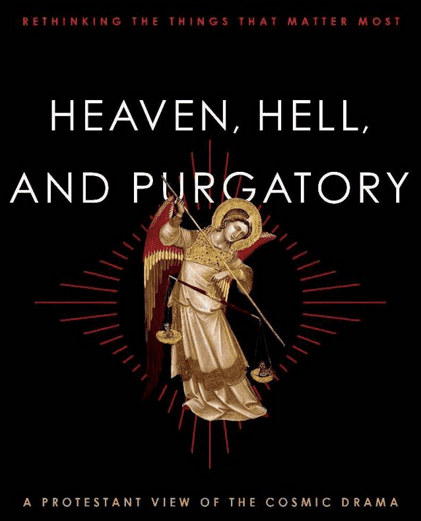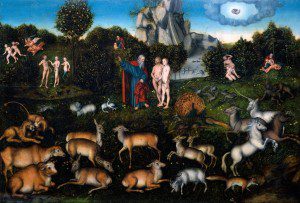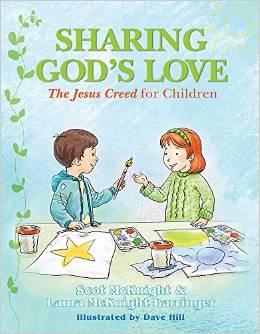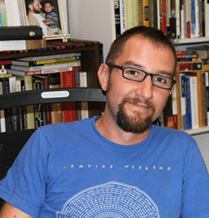 Chapter 11 of Iain Provan’s new book Seriously Dangerous Religion: What the Old Testament Really Says and Why It Matters turns to the question of Hope and God’s plan for the future. What kind of hope is expressed in the Old Testament? This is an excellent chapter, sketching what Provan sees as the sweep of the Old Testament story. The Old Testament is a story of hope. If we miss this thread, we miss everything. And too many have … skipping from the Fall to Matthew. I’ll sketch this chapter briefly, but note that I found it worth the price of the book.
Chapter 11 of Iain Provan’s new book Seriously Dangerous Religion: What the Old Testament Really Says and Why It Matters turns to the question of Hope and God’s plan for the future. What kind of hope is expressed in the Old Testament? This is an excellent chapter, sketching what Provan sees as the sweep of the Old Testament story. The Old Testament is a story of hope. If we miss this thread, we miss everything. And too many have … skipping from the Fall to Matthew. I’ll sketch this chapter briefly, but note that I found it worth the price of the book.
Genesis 1-3 is a passage of hope. Hope begins with creation. There is a hope for the future, with humans walking in harmony with God.
The human beings of Genesis 1–2 are mortal beings, then, who may eventually be given the gift of immortality. … The book of Genesis begins in hope; human beings are born looking forward to something they do not yet possess. This beginning in hope is typically obscured by those who assume that the first humans already possess what, in fact, they have only been promised. (p. 281)
But the hope present in Genesis 1-2 is not limited to humankind. Indeed, there is hope for all of creation.
When our biblical authors tell us that creation is good, they mean that it is a wonderful place, created in such a way as to be exactly the right place—a good and a beautiful place—for the flourishing of God’s creatures. They do not mean that, in this original state, creation has already arrived at its final destination. To the contrary, they tell us in Genesis 1–2 that change is built into the very fabric of creation from the beginning, as its human creatures set out on their quest to multiply, to rule and to subdue, and to keep and to serve. Along with these divine image bearers, nonhuman creation also sets out on a journey; its destiny is bound up with theirs. (p. 284)
The biblical story is not one of lost perfection and a return to Eden. Rather it is a story of a journey to the end God has planned for humanity and for all of creation. It has become a journey of fits, starts, detours, and corrections – not because of God’s ineptness, but because of the freedom he has allowed in his creation.
There is hope in the midst of the evil present in the world. Provan interprets Genesis 3:15 as descriptive of an ongoing battle between two opponents. Certainly the Old Testament is a tale of the battle between good and evil. But it is a hopeful tale. The hope lies “in the mere fact (if it is “mere”) that God continues to pursue a relationship with human beings even after they embrace evil.” (p. 286) God makes a covenant with Abraham so that “all the families of the earth shall be blessed.”
Hope continues through the covenant faithfulness of God. Provan traces this hope through the remainder of the narrative. Exodus and then Deuteronomy extend the covenant relationship with Israel.
In the narrative that follows Deuteronomy, just as much as in the one that precedes it, God works actively in the world to pursue his good ends. As in the Pentateuch, he does so in the midst of significant dysfunction and wickedness even among the people he has called to help him. The story in the first book of Samuel about how Israel eventually came to be ruled by kings illustrates this truth in a striking manner. (p. 290)
In Deuteronomy we see a description of God ordained kingship.
The king, moreover, must not acquire great numbers of horses for himself or make the people return to Egypt to get more of them, for the Lord has told you, “You are not to go back that way again.” He must not take many wives, or his heart will be led astray. He must not accumulate large amounts of silver and gold. When he takes the throne of his kingdom, he is to write for himself on a scroll a copy of this law, taken from that of the priests, who are Levites. It is to be with him, and he is to read it all the days of his life so that he may learn to revere the Lord his God and follow carefully all the words of this law and these decrees and not consider himself better than his brothers and turn from the law to the right or to the left. (17:16-20)
This isn’t the kind of kingship Israel generally experiences. Their kings may not consider themselves semidivine, like those in Mesopotamia and Egypt, but they do acquire horses, wives, and wealth; and they do turn away from God. Samuel warns Israel of this and yet they seek a king. This doesn’t thwart God’s plan, of course. It becomes a means through which God acts.
From this point onward in the biblical story, kingship becomes central to God’s own plans for both Israel and the whole world; it becomes a ground for hope. … Drawing on the language of kingship, the biblical literature then looks forward to a kingdom of God that will one day arrive, at the heart of which will still be a human king. … The institution of kingship is, as I say, accepted into the divine plan—not temporarily but eternally. God does not spend his time in the biblical story fighting against it. He simply seeks, throughout the story, to take what has begun in wickedness and foolishness and turn it toward the good. (p. 292)
The covenant is established through David, a man with serious weaknesses, and yet a man after God’s own heart. He fails miserably in the Bathsheba incident, yet he repents and continues to follow God. He has his share of problems in his family. His son Solomon builds the temple, but proceeds to break every rule given in Deuteronomy concerning kingship. There are a few high points in the later kings (Hezekiah and Josiah are examples), but very few. Israel is sent into exile.
What survives? Has all the hope that was grounded in the monarchy entirely dissipated? The answer is no; hope remains. … [H]ope remains, because God has committed himself to the descendants of David. … The hope is fully expressed, however, in the prophetic literature of the Old Testament…. Here, the biblical authors, for the first time in the biblical story, lay fully bare their convictions about the extent of God’s commitment to his original creation purposes, and they clarify what these purposes are. (p. 295)
The prophetic literature is the core of the Old Testament. Provan doesn’t put it quite like this – but this is the conclusion I have come to, and Provan’s sketch is consistent with this. The core of the old Testament isn’t to be found in stories of heroes and battles. It is the hope and vision cast by the prophets. The prophets look ahead to a time when human relationships with God, others, and the rest of creation will be healed.
They look ahead to a time when these various relationships will be healed—and, beyond that, to an entirely new order of being in the cosmos. The forces of cosmic darkness will be defeated, they tell us, and all the suffering they have initiated will be abolished. More than this, creation itself will be transformed, and, as an aspect of that transformation, immortality will be gifted to human beings after all. The journey with creation upon which God set out “in the beginning” will be completed. There will be redemption of what has gone wrong, but there will also be the fulfillment of the plan that would have been enacted (it seems) even if nothing had gone wrong.
Rather than a return to Eden the prophets look forward to New Jerusalem, with humanity and all of creation forever in safe communion with God. This will involve a transformation of his people, all of humanity. Provan quotes from Ezekiel, Jeremiah, and Isaiah. There is a restoration of right relationship with God and a pressing beyond, to a day when evil is truly conquered. There will also be a transformation of human society. Here the return of the Davidic kingship plays an enormous role, in Ezekiel, Jeremiah, Zechariah, and Isaiah. Among the well known passages:
A shoot will come up from the stump of Jesse; from his roots a Branch will bear fruit. The Spirit of the Lord will rest on him—the Spirit of wisdom and of understanding, the Spirit of counsel and of power, the Spirit of knowledge and of the fear of the Lord—and he will delight in the fear of the Lord. He will not judge by what he sees with his eyes, or decide by what he hears with his ears; but with righteousness he will judge the needy, with justice he will give decisions for the poor of the earth. He will strike the earth with the rod of his mouth; with the breath of his lips he will slay the wicked. Righteousness will be his belt and faithfulness the sash around his waist. (Isaiah 11:1-5)
The righteous king establishes a just human society.
Finally there is a transformation of creation. This is found in Ezekiel, Hosea, Isaiah.
In these various passages, the human relationship with other creatures, and with the earth itself, is healed. But more than this, the cosmos is radically transformed. In the created world as we know it, no wolf would ever cohabit with a lamb; no leopard would ever lie down with a goat (Isaiah 11:6). This is an entirely new order of things—a new heavens and a new earth (Isaiah 65:17-25; 66:22-23; Ezekiel 47:1-12). Only in such a new world could it possibly be that the sound of weeping would never be heard (Isaiah 65:17) and that everyone could be guaranteed to live to a ripe old age (65:20). Indeed, only in such a new world could death itself conceivably be swallowed up forever (Isaiah 25:8); only there could it be true that “multitudes who sleep in the dust of the earth will awake: some to everlasting life, others to shame and everlasting contempt” (Daniel 12:2). Here, in the end, we discover that the possibility of immortality has not, after all, disappeared from biblical hope. It is still very much alive. (p. 301)
The Old Testament hope is also an active hope. The hope calls people into action establishing justice, worshiping the one true God, and healing relationships. This is an assurance that in the end God’s purposes will be achieved and a call to live in the future today.
Hope is what keeps one going, living a good and a just life in the midst of very real challenges—hope, and also faith. Faith holds that God does still live in his temple-cosmos—that God is still at work here and now in this present world, drawing it toward the good. Faith insists that God himself is good. It holds that God’s kingdom is not simply future but now and that God is continually blessing his creatures in this kingdom now. To have faith, then, is to participate actively in this work of God in the world, as we live out our vocation as kings and priests.
… Hope tells us that success is possible in the here and now, because in cosmic terms it is inevitable. Those captivated by biblical faith therefore keep on pursuing the prophetic vision now, because they know that one day it will come to pass. (p. 304)
This is a summary of Provan’s discussion. He goes into far more detail about each of the major points. The sweep of Scripture, framed by hope and culminating in the prophets, leads directly into the New Testament and the Gospels. On the road to Emmaus Jesus said to the two travelers “How foolish you are, and how slow to believe all that the prophets have spoken!” … And beginning with Moses and all the Prophets, he explained to them what was said in all the Scriptures concerning himself. (Lk 24:25,27). The early Christian community, and the authors of the Gospels, saw this connection. It is impossible to truly understand the Gospels without the Prophets. In the next chapter Provan will connect his sketch of the Old Testament vision to the New Testament story of Jesus.
What do you think of Provan’s sketch of the Old Testament vision of hope?
Is this central to the story?
What kind of story is the Old Testament: a story of heroes for our edification? a story Israel’s failings? a story of God’s faithfulness?
If you wish to contact me, you may do so at rjs4mail[at]att.net.
If interested you can subscribe to a full text feed of my posts at Musings on Science and Theology.





















